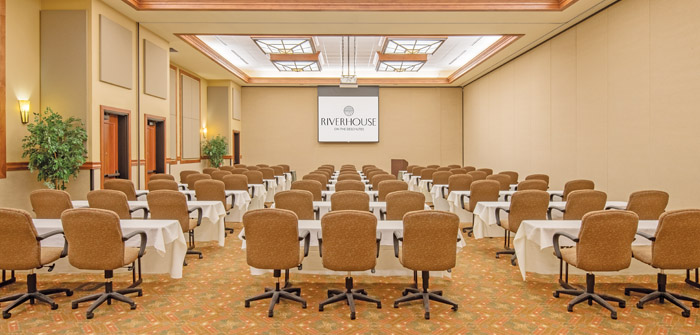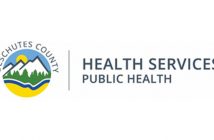(Riverhouse on the Deschutes has suffered losses to its group business due to the pandemic | Photo Courtesy of Riverhouse on the Deschutes)
Of all the industries affected by the COVID pandemic, perhaps none have been hit as hard as that of travel and leisure, globally and locally.
In a letter to Congress, the American Hotel & Lodging Association (AHLA) reported the following: “The hotel industry has been decimated by the COVID-19 health crisis. According to the Bureau of Labor Statistics (BLS), the leisure and hospitality sector lost 7.7 million jobs in April alone. That is more jobs than construction, manufacturing, retail, education and health services combined. The human toll on our employees and our workforce is devastating. The economic impact to our industry is equally as dramatic, estimated to be nine times greater than the September 11 terrorist attacks. According to Oxford Economics, nearly 4 million hotel employees have been furloughed or laid off, and the industry is expected to lose nearly 50 percent of its total revenue in 2020 — which could exceed $120 billion.”
Here in Central Oregon, where tourism is a key part of the economy, the loss is being felt by hotels, tour companies and other travel-related businesses. “The tourism industry in Central Oregon has been seriously impacted by the pandemic, with full or partial closures of most tourism-related businesses in April and May. Job losses in the tourism sector have been the hardest-hit sector; 50 percent of tourism businesses saw revenue decline by 90 percent or more in April,” said Julia Theisen, CEO of Central Oregon Visitors Association (COVA), a nonprofit tourism destination marketing association. “For example, May 3-9 (of this year), Central Oregon was at 26 percent occupancy, verses 70 percent during the same time period last year.”
“The industry was decimated by the pandemic. Lodging and restaurants were off to the best start they have ever seen in Bend, and then everything came to a screeching halt in late March,” said David Lenke, general manager of Riverhouse on the Deschutes, which houses the largest convention center east of the Cascades. “Most hotels have lost all group business through the end of September at this point, and it could be much longer depending on what the state does in terms of lifting gathering restrictions.” When the pandemic closure first hit, Lenke said Riverhouse had some guests, but primarily only those passing through for essential travel. “There were a lot of displaced people moving to Bend. Rentals weren’t vacant, home closings were delayed, and so forth. Now that business is starting to open again, we are seeing business travel start to come back.”
In April, a survey was conducted in English and Spanish by Business Oregon, Travel Oregon and the Oregon Small Business Development Center Network in an effort to understand the impacts COVID-19 has had on the business community. More than 5,000 responses were submitted, with more than 69 percent of the responses completed by small businesses with fewer than ten employees. The survey revealed that only 33 percent of businesses have workforces that can work remotely, and only 12 percent of tourism jobs can be done remotely. The survey also showed that accommodation, arts, entertainment and recreation sectors faced the largest revenue declines.
“The hospitality industry is in a fight for survival,” said Chip Rogers, president and CEO of AHLA. “We are grateful to the leadership of both parties during one of the most difficult health and economic challenges we have faced. We are urging Congress to do even more to help the hotel industry so that our small business hotel operators can keep the lights on and retain and rehire employees.”
In the report by AHLA, it was stated that 2020 is projected to be the worst year on record for hotel occupancy, and experts estimate it will be at least 2022 before hotels return to their 2019 occupancy and revenue levels. In a recent survey of AHLA members, more than eight in ten hotel employees said they have had to lay off or furlough workers. Only 37 percent have been able to rehire any staff through economic relief measures such as the Paycheck Protection Program (PPP). The new sanitation requirements have also taken a toll on the industry, with added staff needed to keep up with the recommended protocols. “The impact is felt in the cost of increased cleaning supplies and PPE (personal protective equipment) for our associates,” said Lenke. “As we have added enhanced cleaning standards and schedules for our public spaces, we are also having to add labor in order to spend more time making sure rooms and public spaces are sanitized correctly.”
Despite the devastating statistics, Theisen and Lenke believe Central Oregon will bounce back. Though the health and safety regulations formulated for hotels will help put travelers’ minds at ease, Lenke said he doesn’t think that those measures will be what recovers the industry. “What is going to recover the industry is people wanting and willing to get out and travel. If Memorial Day is any indication of people willing to travel, then I think destinations that are considered drive markets will recover fairly quickly. We just need people to be smart and understanding of the rules and restrictions that are currently in place.” Lenke said Riverhouse on the Deschutes will offer incentives to bring travelers back. “We always have a variety of packages available, and we will continue to partner with all our existing partners and some new partners to offer packages for our guests to choose from.”
The AHLA is striving to restore tourism as well, and recently released a “Roadmap to Recovery,” which calls on Congress to prioritize relief for hotel workers and small businesses in the next stimulus package. In its letter to Congress outlining the Roadmap to Recovery, AHLA is urging Congress to provide immediate assistance in these four areas:
- Help hotels retain and rehire employees by extending the Paycheck Protection Program, offering employees direct tuition assistance or tax credits and expanding the Employee Retention Credit;
- Protect employees and guests through tax credits for cleaning equipment and personal protective equipment (PPE);
- Keep hotel doors open by providing relief for hotel commercial mortgages and increasing the size and flexibility of PPP loans; and
- Incentivize Americans to travel again when it’s safe with a new, temporary travel tax credit and restoring the entertainment business expense deduction.
With a presence in every congressional district in America, AHLA says hotels are central to getting our economy back on track and supporting millions of jobs. It reports that prior to the pandemic, hotels supported one in every 25 American jobs — 8.3 million total — and contributed $660 billion to U.S. GDP. As an example, AHLA says that a representative hotel with 100 occupied rooms per night supports nearly 250 jobs in the community and generates $18.4 million in guest spending at neighborhood shops and restaurants. Hotels also generate $186 billion in local, state and federal taxes each year. “While the hotel industry was one of the first affected by the pandemic, we have collectively stepped up to serve our communities during this public health crisis,” said Rogers. “We need Congress to continue to prioritize the industries and employees most affected by the crisis, so we can retain and rehire the people who power our industry, our communities and our economy.”
Theisen said COVA supported the local travel industry during the closures by taking immediate action to pause its paid advertising campaign, and assisted tourism businesses through the “Central Oregon Strong” campaign, which promoted restaurants and other businesses that were open for online or curbside service via social media. “We have also remained top of mind with our visitors, inviting them to join us on a virtual adventure with our Adventure Call Series (adventurecalls.visitcentraloregon.com) and other virtual ways to experience the region,” she said. “When non-essential travel is open, we will be poised to market the region to our visitors and welcome them back to Central Oregon while informing them of safety protocols that tourism businesses are implementing. I believe that Central Oregon will be ready to welcome visitors back who are seeking responsible vacations where they can enjoy the great outdoors and wide-open spaces.”
In an industry update, COVA prepared a four-stage marketing strategy to help bring the region’s tourism economy back to full recovery. (industry.visitcentraloregon.com/wp-content/uploads/2020/05/VCO-Regional-Recovery-Plan.pdf). In the plan, the four stages of recovery include staying connected, planning ahead, getting excited and booking travel. Theisen agrees that hotels and other tourism businesses are working hard to modify the way they do business to safely welcome back visitors. “Traveler sentiment shows that many Americans miss their vacations, and there is pent-up demand for getting out of town. Visit Central Oregon will be working with our regional tourism partners to safely welcome visitors back to the region and begin to rebound from the economic impact we’ve seen over the past few months. It may take some time to recover, but tourism will pave the road for many of our region’s businesses.”





